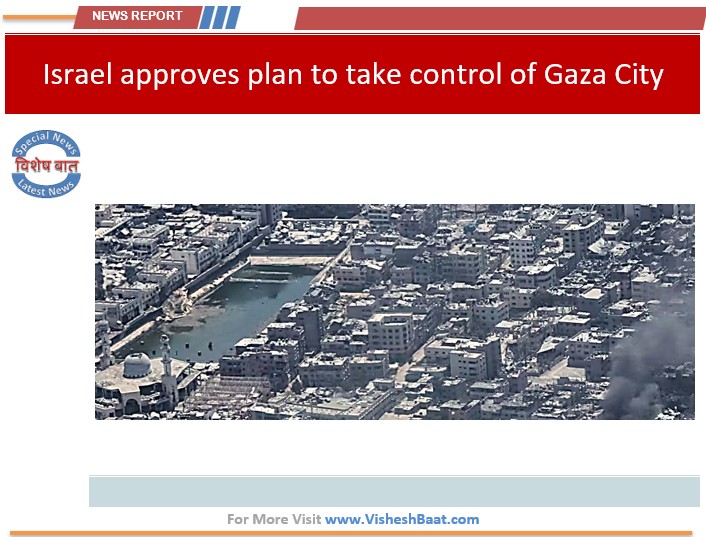Decision approved, controversy immediate
Israel’s political-security cabinet this week approved a plan that would extend Israeli military control over Gaza City — a move the government frames as aimed at dismantling Hamas’s remaining structures and ensuring the release of hostages. Officials publicly described the measure as a tactical expansion of operations, not necessarily permanent governance, and said future civil administration would be handled by other stakeholders. But the approval has triggered immediate and strong criticism internationally and at home, with observers warning that an occupation of Gaza City risks a dramatic humanitarian escalation in an already devastated territory. The approval followed intense internal debate, with military leaders and some ministers reportedly cautioning about the risks to hostages and civilian lives.
International reactions and policy consequences
World capitals, international organisations and key allies quickly signalled concern: some countries called the move a dangerous escalation, while others sought emergency diplomacy to prevent mass displacement. Notably, Germany moved to restrict some arms exports that could be used in operations affecting Gaza — a striking policy shift for a close Western partner and indicative of how public pressure and humanitarian concerns are reshaping alliances. Regional actors and the UN also warned of consequences for civilian safety, relief access and prospects for a longer-term political settlement, urging restraint and humanitarian corridors. These diplomatic ripples reflect how military decisions on the ground can produce swift geopolitical consequences.
Humanitarian, legal and military dimensions to watch
Beyond diplomacy, the practical questions are grave: Gaza City is densely populated, and an expanded ground operation could displace large numbers, create access and supply bottlenecks for aid, and raise difficult legal questions about proportionality and protection of civilians. Military planners must weigh the potential tactical gains against likely humanitarian fallout and political costs; analysts warn that even if the operation achieves short-term objectives, it could harden regional opposition and complicate hostage-release negotiations. The international community is now focused on whether diplomatic pressure and humanitarian contingencies can limit civilian suffering while any security objectives are pursued.
हिंदी अनुवाद
फैसला मंजूर, विवाद तुरंत शुरू
इज़राइल की राजनीतिक-सुरक्षा कैबिनेट ने इस सप्ताह एक योजना को मंजूरी दी है जो गाज़ा सिटी पर इज़राइली सैन्य नियंत्रण बढ़ाने की रूपरेखा देती है — सरकार का कहना है कि इसका मक़सद हमास के बाँकी ढाँचों को तहस-नहस करना और बंधकों की रिहाई सुनिश्चित करना है। अधिकारियों ने इसे स्थायी शासन नहीं बल्कि कार्रवाई का विस्तार बताया और कहा कि भविष्य में नागरिक प्रशासन अन्य हाथों द्वारा सम्भाला जाएगा। फिर भी इस मंजूरी पर तुरंत ही घरेलू और अंतरराष्ट्रीय स्तर पर तीखा विरोध हुआ है; विशेषज्ञों का चेतावनी है कि गाज़ा सिटी पर कब्ज़ा पहले से ही तबाह क्षेत्र में मानवीय तबाही को बढ़ा सकता है। यह निर्णय भी भीतर गहन बहस के बाद आया, जहाँ सैन्य और कुछ मंत्रियों ने बंधकों और नागरिकों के जोखिमों पर सावधानी जताई।
अंतरराष्ट्रीय प्रतिक्रिया और नीति प्रभाव
दुनिया भर की राजधानियों, अंतरराष्ट्रीय संगठनों और प्रमुख सहयोगियों ने शीघ्र चिंता जताई: कुछ देशों ने इसे “खतरनाक वृद्धि” कहा, जबकि अन्य ने बड़े पैमाने पर विस्थापन से बचने के लिए आपातकालीन कूटनीति की माँग की। खासकर जर्मनी ने वे हथियार निर्यात सीमित करने के कदम उठाए जो गाज़ा पर प्रभाव डालने वाले ऑपरेशनों में उपयोग हो सकते थे — यह एक करीबी पश्चिमी साझेदार के लिए उल्लेखनीय नीति बदलाव है और दर्शाता है कि सार्वजनिक दबाव और मानवीय चिंताएँ गठबंधनों को कैसे प्रभावित कर रही हैं। क्षेत्रीय खिलाड़ी और संयुक्त राष्ट्र ने भी नागरिक सुरक्षा, राहत पहुँच और दीर्घकालिक राजनीतिक समाधान के नज़रिए से गंभीर आशंकाएँ जताईं।
मानवीय, कानूनी और सैन्य आयाम पर निगरानी
कूटनीति से परे, व्यावहारिक प्रश्न गंभीर हैं: गाज़ा सिटी घनी आबादी वाला क्षेत्र है और किसी भी विस्तारित जमीनी अभियान से बड़ी संख्या में लोग विस्थापित हो सकते हैं, राहत के लिए पहुंच और आपूर्ति बाधित हो सकती है, और यह अनुपातिकता व नागरिक सुरक्षा संबंधी कानूनी प्रश्न उठा सकता है। सैन्य योजनाकारों को संभावित रणनीतिक लाभों को मानवीय परिणामों और राजनीतिक लागत के साथ तुलना करनी होगी; विश्लेषक चेतावनी देते हैं कि भले ही अभियान अल्पकालिक उद्देश्यों को पूरा कर ले, पर यह क्षेत्रीय विरोध कड़ा कर सकता है और बंधकों की रिहाई वार्ताओं को जटिल बना सकता है। अंतरराष्ट्रीय समुदाय अब यह देख रहा है कि कूटनीतिक दबाव और मानवीय उपाय नागरिकों के कष्ट को सीमित कर पाएँगे या नहीं।
